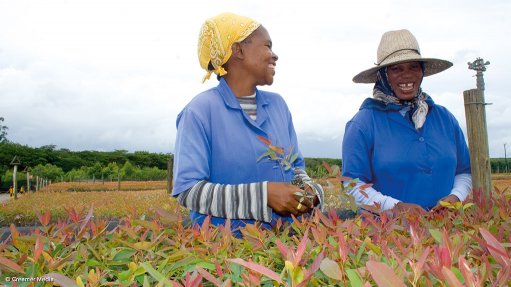
Photo by: Duane Daws
International packaging and paper group Mondi on Thursday signed a settlement agreement with the Department of Rural Development and Land Reform for land claims lodged by the Mkhuzane community for land in the Richmond area and the Nodunga community for land in the Stanger area, both in KwaZulu-Natal.
The agreements included the signing of lease agreements between Mondi and the two communities for the purpose of commercial forestry, which would run for an initial period of ten years, subject to further renewal thereafter.
As part of the initial lease agreement, Mondi would assist each of the two communities in setting up forestry contracting businesses on 1 781 ha of land bought by the State for R26.9-million for the Mkhuzane community, and 685 ha, valued at R7.4-million, for the Nodunga community, enabling them to acquire the necessary skills to benefit from business opportunities on the land.
“I commend Mondi for taking the journey with the department in the quest for reformation of the land ownership patterns through, besides others, the Restitution of Land Rights programme.
“We cannot overemphasise that, for land reform to succeed in this country, all must come to the party,” Rural Development and Land Reform Deputy Minister Candith Mashego-Dlamini said at the signing.
During the first year of lease, a rental fee of 7% of R1.6-million would be paid to the Mkhuzane community, and R507 000 to the Nodunga community.
A total of 247 households, including 880 individual beneficiaries from the Mkhuzane community, and 376 households, including 2 256 beneficiaries, from the Nodunga community, would benefit from the agreements.
“This is the kind of development that we envisaged when the democratic government introduced the land restitution programme in 1994. It is also in line with our proclamation in the Freedom Charter that South Africa belongs to all those who live in it, that all South Africa’s children must benefit from the resources of the land,” Mashego-Dlamini noted.
The parties would draw up terms of reference for capacity building of the communities, with service providers being identified to provide training and capacity building for the communities to manage the leases, resolve disputes and manage the land.
The department would also work with the community to draw up business plans, which would detail projects in line with the development aspirations of the communities and identified opportunities. The business plans would then be submitted to the different arms of government and other entities for funding.